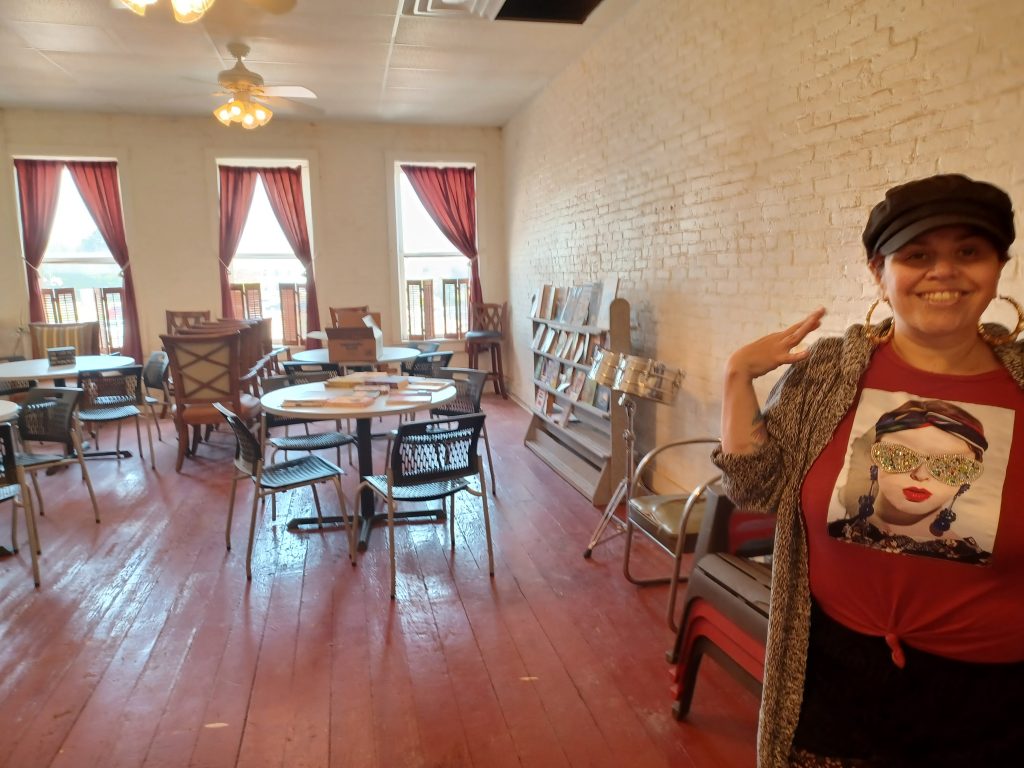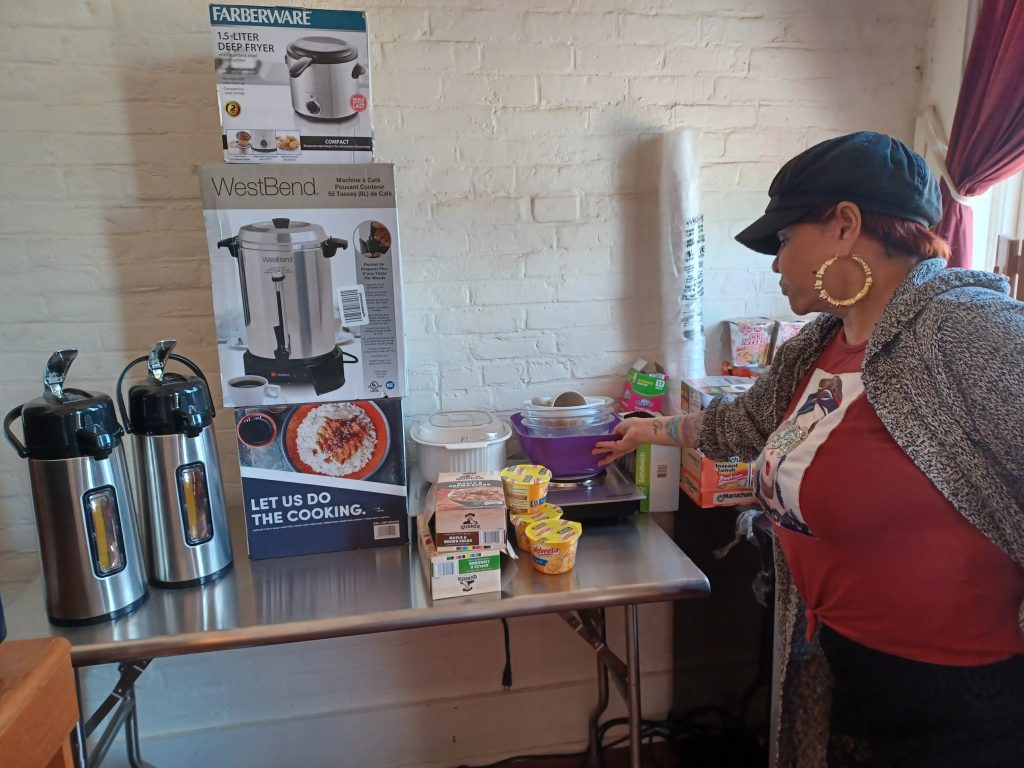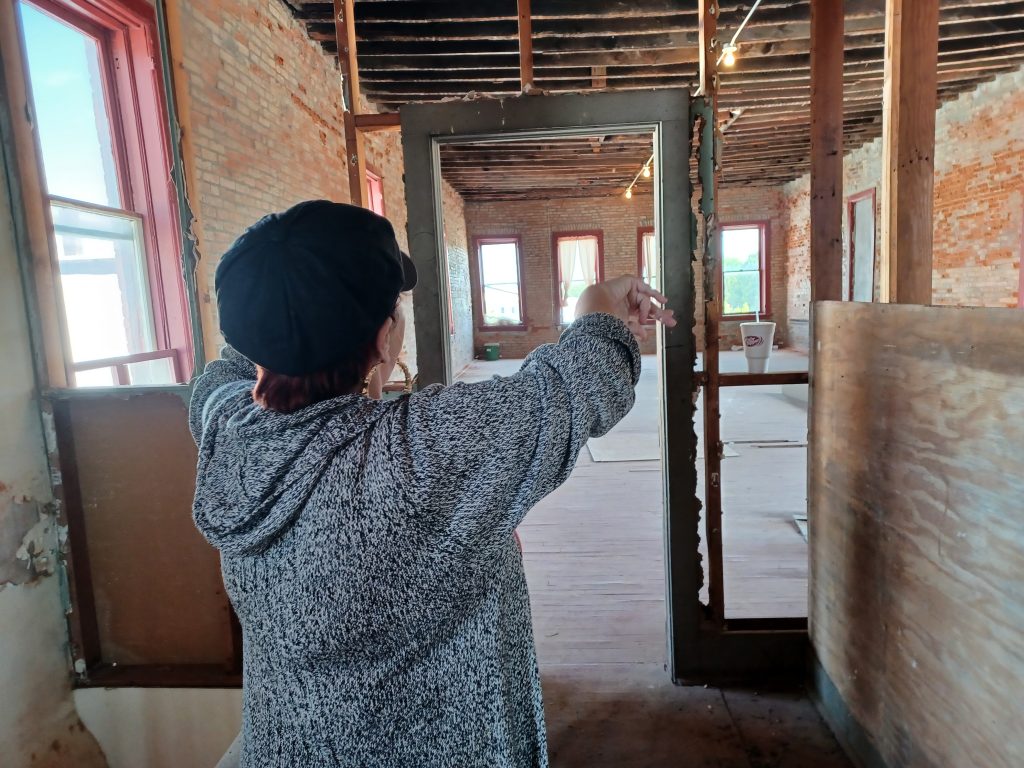|
|
|
|
|
|
|
|
|
|
|
|
|
|
|
|
|
|
|
|
|
|
|
|
|
|

Mayra Montanez has a heart for the disadvantaged, because at one time she was one.
She is the daughter of an Assembly of God pastor in Puerto Rico.
And life happened.
“I was a single parent on my own, and needed help,” she said. “I know how it feels to have limited resources and have pride…to be employed and not have enough money to go to work.”
To this day her heart is touched by the issues of others.
“In the winter, I wake my husband up, it’s snowing, and we will go look for people on the streets,” she said. “It breaks my heart.”
Montanez started the process of of non-profit 501 3c designation last fall, called As You Are Ministry. She has received calls from the community for people in need.
The second floor of the family owned business, Fort Scott Barber Shop, is being transformed to help meet the needs of the community, little by little.
Last month, the family installed a heating and air conditioning system with a separate power line to the second floor of their business building. They recently got a website going.
They have been working on the second floor of the building, for ministering to the community. It has a gathering place, a kitchenette, her office and the future bathroom/shower room.
The third floor is another step down the road, with the idea of providing temporary housing for those who need it.

“You can warm up, or cool down,” in the gathering place they have prepared, she said. There is also a kitchenette to provide some refreshments to those who gather.
“The next step is a bathroom,” Montanez said. “We have no plumbing up here.”

Then, if someone got their water cut off or is homeless, the ministry could provide a bathroom service.
“Sometimes when things happen in life, where their money didn’t go as far the month, we can help,” she said.
“We want to meet people where they are,” Montanez said.
Some of the products/services they can currently provide, besides the community gathering place:
Her husband, Jose, and their children are highly involved in her ministry and helping people, she said.
The goal is to “help people who sometimes need a little push to move forward, no judgement,” she said. “From there they can do it. We want to be able to help those who need a little or a lot of help. If we can, we will.”
As You Are Ministry is located above the family’s barber shop at 118 E. Wall.

They have someone who is willing to do the labor for free for the bath/shower room, if the Montanez’s will provide the materials, she said.
They have applied for a grant through the Healthy Bourbon County Action Team for the toilet and sinks.
If they aren’t approved for that, they will have to wait a little longer, but she is hoping to have it done by winter, she said.
Hours are by appointment.
For more information: 913.708.5234.
~~Attendees at Wichita Summit Strategize How to Maximize Impact of Over $3.8B Investment in Infrastructure~~
WICHITA – Governor Laura Kelly today welcomed Kansans to the first-ever Infrastructure Summit hosted by the newly formed Kansas Infrastructure Hub. At the Summit, which takes place July 13 and 14 in Wichita, more than 650 people from across the state are learning more about the grant opportunities available under the federal Bipartisan Infrastructure Law (BIL), discussing strategies for preparing winning grant applications, and sharing input on infrastructure priorities in Kansas.
“Local governments are on the frontlines providing the quality infrastructure that we all rely on to meet our most basic needs and generate long-term prosperity,” said Governor Kelly. “I’m grateful we could bring together infrastructure leaders from across the state to strategize how we can strengthen Kansas for years to come.”
Under BIL, Kansas will receive close to $3.8 billion in direct funds over the next five years for transportation, water, energy, and broadband projects. Kansas could potentially receive more by applying for competitive grants.
Kansas is one of the first states in the nation to convene conversations at the local level about how federal, state, and local governments and the private sector can better work together to better leverage the dollars to maximize their impact and mitigate challenges associated with delivering these infrastructure improvements.
“These dollars present a tremendous opportunity for Kansas, but with that opportunity also comes a responsibility to deliver,” said Kansas Department of Transportation Secretary Julie Lorenz. “Whether it’s workforce shortages, inflation, or red tape, we know there will be challenges to achieve the improvements taxpayers deserve, which is why collaboration at all levels of government and the private sector will be critical. I’m so pleased that Kansans from all every region are here to strategize how we can better work together.”
Summit attendees are hearing from subject matter experts about resources available for transportation, water systems, broadband, energy, resilience, and cybersecurity and are learning how to apply for the various grant programs that will become available over the next five years. During this summit, attendees are sharing how the State could better assist them in meeting their infrastructure needs and help communities prioritize their needs at a regional level.
Secretary Lorenz serves as a Chair of the Kansas Infrastructure Hub. In June, Governor Kelly announced the launch of the Hub, a state agency subcabinet working group comprised of representatives from the Kansas Departments of Administration, Agriculture, Commerce, Health and Environment, and Transportation; the Kansas Corporation Commission; and the Kansas Water Office. The Hub has an advisory group comprised of public and private sector leaders and stakeholders across the state that will help determine funding priorities, identify barriers to distributing funds, and communicate the Hub’s work to community members. To learn more about the Kansas Infrastructure Hub, visit KSHUB.org.
KCC launches Energy Smart Kansas website devoted to energy efficiency
TOPEKA – The Kansas Corporation Commission (KCC) recently launched Energy Smart Kansas, a website devoted to helping shape the future of energy efficiency opportunities in the state. Kansans are invited to provide feedback about the types of programs and potential rebates they are interested in. They will also find information on current state and federal offerings.
The creation of Energy Smart Kansas is a direct result of efforts by the Kansas Energy Office — funded by the Department of Energy — through the Kansas Corporation Commission, to engage Kansans in the conversation and promote awareness of the ways energy efficiency can save energy and money.
With record-high temperatures and rising energy costs, Kansans are looking for ways to combat high energy bills this summer. The KCC is calling on all Kansans to share their feedback on how energy efficiency can help provide solutions for their energy needs and equip them with the tools to save money and energy in their homes and workplaces.
As the KCC continues to explore possibilities for new energy efficiency incentives, Kansans can learn how to start saving energy and money today and show their support for additional offerings by visiting EnergySmartKansas.org.
About the Kansas Corporation Commission The mission of the Energy Office of the Kansas Corporation Commission (KCC) is to promote energy conservation and efficiency in Kansas and to serve as a clearinghouse for information on alternative energy and other energy topics. In support of this mission, the Energy Office administers programs, promotes public education through outreach activities, coordinates government and private sector activities, and provides objective and up-to-date information on energy-related topics.
About Energy Smart Kansas The creation of Energy Smart Kansas is a direct result of efforts driven by the Kansas Energy Office, funded by the Department of Energy, through the Kansas Corporation Commission to explore the conversation and promote awareness of energy efficiency with Kansans across the state. In 2020, the KCC Energy Office and Utilities Division worked together with the Research Partnership at Wichita State University to survey Kansans on their knowledge of and attitudes towards energy efficiency. A majority of research participants, across all groups, held favorable attitudes about energy efficiency and showed interest in potential rebate offerings on energy efficient appliances. The KCC continues to explore the possibility of working with utilities to create new energy efficiency programs across the state.
About the United States Department of Energy The United States Department of Energy (DOE) is an executive department of the U.S. federal government that oversees U.S. national energy policy and manages the research and development of nuclear power and nuclear weapons in the United States. The DOE oversees U.S. nuclear weapons program, nuclear reactor production for the United States Navy, energy-related research, and domestic energy production and energy conservation. Their mission is to ensure America’s security and prosperity by addressing its energy, environmental and nuclear challenges through transformative science and technology solutions.
(Washington, D.C., July 13, 2022) – TODAY, U.S. Senator Roger Marshall, M.D. – an OBGYN responsible for delivering more than 5,000 babies – will serve as Ranking Member for a U.S. Senate Committee on Health, Education, Labor, and Pensions (HELP) hearing on abortion laws following the U.S. Supreme Court’s overturning Roe v. Wade and returning the issue of abortion to state governments. The hearing will take place at 10:00am ET and will be streamed online here: help.senate.gov.
Earlier this week, Republicans on the Senate HELP Committee announced Brandi Swindell, Founder and Chief Executive Officer of Stanton Healthcare, will testify before the Committee about her work providing life-affirming maternal and infant health care for women experiencing unplanned pregnancies. Ms. Swindell will share the story of her organization’s success in providing alternatives to abortion and compassionate care to women across America.
Hearing Details:
WHAT: Senate HELP Committee Hearing
WHEN: TODAY, Wednesday, July 13th at 10:00am ET
WHERE: Senate Hart 216 or streaming online at help.senate.gov
“Overturning Roe vs Wade was a historic occasion that signaled a new beginning for millions of unborn children. Now, the future of saving lives rests with the American people and their elected officials in the states. But this work is not finished. Mothers must continue to have access to services that will support them and their baby throughout and after their pregnancy, and women need to understand the undeniable threats that are posed by abortion methods, especially if they are prescribed and used incorrectly,” said Senator Marshall. “I’m looking forward to informing the American public why the Supreme Court’s decision is a positive development for our country and setting the record straight in the face of radical pro-abortion fearmongering. I appreciate Ranking Member Burr for yielding me the opportunity to use my knowledge and background as an OBGYN who delivered more than 5,000 babies to lead this hearing.”
Background:
Senator Marshall practiced medicine in Great Bend, KS for more than 25 years. As an OB/GYN, he delivered more than 5,000 babies, giving him a deep appreciation and passion for the sanctity of life and an intimate understanding of the healthcare system. During his time in medicine, Senator Marshall was more than a physician. For 25 years, he was a business owner who signed a paycheck every other week for a practice that grew from 5 people to eventually more than 300.
In April 2022, Senator Marshall questioned Food and Drug Administration (FDA) Director for the Center for Drug Evaluation and Research, Dr. Patrizia Cavazzoni, about the Biden Administration’s efforts to reduce safety protocols for chemical abortion drugs. You may click HERE for video of Senator Marshall’s questioning.
In June 2022, Senator Marshall offered an amendment to the Food and Drug Administration Safety and Landmark Advancements (FDASLA) Act that would require FDA-approved chemical abortion drugs to be prescribed only after a patient has been diagnosed using a medical imaging device. Senator Marshall’s amendment would have ensured appropriate use and informed consent before receiving abortion drugs. The amendment was modeled after Senator Marshall’s Ultrasound Informed Consent Act.
Upon entering the U.S. Senate in January 2021, Senator Marshall’s first bill was the Protecting Life in Crisis Act. This legislation would prohibit any funds that are authorized or appropriated for the purposes of preventing, preparing for, or responding to the COVID–19 pandemic, domestically and internationally, from going toward abortions or abortion coverage. Additionally, Senator Marshall is an original cosponsor of the following pro-life bills:
Bring them to Fort Scott NHS and Find Out!
Fort Scott Kan. – Saturday, July 23, 2022, at 9:30 am, Fort Scott National Historic Site, American Legion Post 25, and Fort Scott Fire Department will be hosting an official US Flag Disposal Ceremony. Bring your: United States, POW/MIA, State, and Service (U.S. Army, U.S. Marine Corps, U.S. Navy, U.S. Air Force, U.S. Coast Guard) flags to the fort between now and 9:30 am Saturday and we will properly and respectfully dispose of them. Just as there’s etiquette for displaying Old Glory, there’s also etiquette for disposing of flags in a dignified manner.
“4 U.S. Code § 8k (Respect for flag) states that ‘The flag, when it is in such condition that it is no longer a fitting emblem for display, should be destroyed in a dignified way, preferably by burning.’” said Carl Brenner, Acting Superintendent, Fort Scott National Historic Site. “As with celebrating this country’s newest citizens at our Naturalization Ceremony and honoring those we have lost through the ‘Field of Honor’ during Symbols of Sacrifice, we are proud to be a part in honoring this country’s flag by hosting this ceremony.”
From April 1-October 31, Fort Scott National Historic Site, a unit of the National Park Service, will be open for its summer hours of operation. The site exhibit areas and visitor center are open daily from 8 a.m. – 5 p.m. Park grounds are open daily from a half hour before sunrise until a half hour after sunset. To find out more or become involved in activities at the Fort, please contact the park at 620-223-0310 or visit our website at www.nps.gov/fosc.
-NPS-
Credit Photo as: NPS Photo
|
|
|
|
|
|
|
|
|
|||||||||
|
The Land Bank meeting will be held on Monday, July 18th, 2022 at 4:00 p.m. at City Hall, 123 S. Main Street, Fort Scott, Kansas, in the City Commission meeting room.
This meeting will be made available via the City’s you tube channel at City of Fort Scott.
The Land Bank work session will be held on Friday, July 15th, 2022 at 2:00 p.m. at City Hall, 123 S. Main Street, Fort Scott, Kansas, in the City Commission meeting room. No action will be taken during the work session.
This meeting will be made available via the City’s you tube channel at City of Fort Scott.
TOPEKA – Drivers on the nation’s highways may find themselves under the watchful eye of law enforcement a little more than usual this week. Operation Safe Driver Week is being observed July 10-16. The goal of the yearly observance, started by the Commercial Vehicle Safety Alliance (CVSA), is to reduce the number of crashes involving commercial trucks through education, traffic enforcement strategies and interactions with law enforcement. However, any driver, regardless of whether they are driving a big rig or a passenger vehicle will be cited if dangerous driving such as speeding, distracted driving, following too closely, improper lane change, drunk or drugged driving is observed.
Special investigators with the Kansas Corporation Commission (KCC), which regulates motor carriers in the state, are teaming up with Kansas Highway Patrol Troopers and Federal Motor Carrier Safety Administration Investigators to conduct inspections at weigh stations located in Olathe (both North and Southbound), Wabaunsee, Belleville, Kanorado, Liberal and South Haven. At the weigh stations, they will also be talking to motor carriers about the need to focus on improving their driving routines when sharing the road with others.
“Unfortunately yesterday, Kansas had its 31st tragic fatal crash involving a commercial motor vehicle (CMV) when a pick-up ran into the back of a turning CMV on US-160 in Stanton County. Last year there were a total of 52 fatal crashes involving CMV’s in Kansas, at this rate that number will be exceeded this year. Many of these crashes were the result of unsafe driving and poor decisions. That is the purpose of these initiatives, to educate everyone to be safe when traveling on the highways, whether they are in a commercial or personal vehicle. We want everyone to arrive at their destination safely.” said Gary Davenport, KCC Deputy Director of Transportation.
The KCC offers some safety best practices for drivers to keep in mind when sharing the road with large trucks this summer.